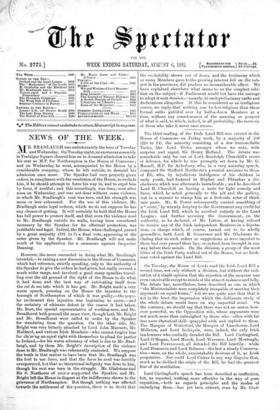However, the move succeeded in doing what Mr. Bradlaugh intended,—in
raising a new discussion in the House of Commons, which had reference, strictly speaking, only to the authority of the Speaker to give the orders he had given, but really covered a much wider range, and involved a good many speeches travel- ling over the old ground of the right of the House to do what it had done, and the best way of extricating itself from the cal de sac into which it has got. Mr. Bright made a very warm speech, pressing on the House the injustice to the borough of Northampton of which it was guilty,—the popu- lar excitement this injustice was beginning to cause,—and the certainty of ultimate defeat in the course it had taken. Mr. Burt, the special representative of working-men, and Mr. Broadhurst both pressed the same view, though both Mr. Bright and Mr. Broadhurst were called to order by the Speaker for wandering from the question. On the other side, Mr. Bright was very bitterly attacked by Lord John Manners, Mr. Hubbard, and various Irish Members—who cannot forgive him for claim'ng an equal right with themselves to plead for justice to Ireland,—for his warm advocacy of what is due to Mr. Brad- laugh, and by them Mr. Bright's description of the violence done to Mr. Bradlaugh was vehemently contested. We suppose the truth in that matter to have been that Mr. Bradlaugh was the first to use force, and that the force he used was forcibly overpowered, bat that no intentional indignity was done to him, though his coat was torn in the struggle. Mr. Gladstone and Sir S. Northcote of course supported the Speaker, and Mr. Bright left the House in disgust at the indifference shown to the grievance of Northampton. But though nothing was effected towards the settlement of the question, there is no doubt that
the excitability shown out of doors, and the testimony which so many Members gave to the growing interest felt on the sub- ject in the provinces, did produce no inconsiderable effect. We have explained elsewhere what seems to us the simplest solu- tion on the subject—if Parliament would but have the courage to adopt it next Session,—namely, to omit preliminary oaths and declarations altogether. If this be considered as an irreligious course, we reply that nothing can be less religious than these formal oaths gabbled over by half-a-dozen Members at a time, without any consciousness of the meaning or purport of what is said, to which, indeed, in all probability, the memory of those who take it never once recurs.






























